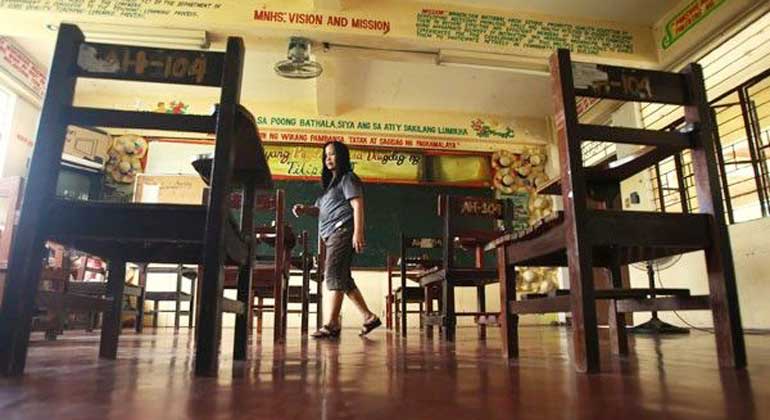
A HOUSE of Representatives committee approved on Monday a proposal seeking to revamp the government’s private education voucher program to help ease classroom congestion in government schools.
The House Basic Education committee consolidated over 15 bills aimed at strengthening the private school voucher program by introducing a criteria-based system for underprivileged students and establishing a private education bureau to oversee its implementation. A copy of the substitute bill was not made immediately available.
“By institutionalizing the voucher program, we give poor and deserving families the freedom to choose private schools when public schools cannot take them in,” Party-list Rep. Jude A. Acidre told the panel.
The Government Assistance to Students and Teachers in Private Education (GASTPE) is a state-run subsidy program that covers tuition for high school students enrolled in private schools, designed to ease overcrowding in public institutions and support the viability of private education.
The Philippines has a backlog of about 165,000 public school classrooms, mainly caused by limited funding, slow procurement processes and a surging student population, according to the Education department.
The proposal is among House Speaker Ferdinand Martin G. Romualdez’s priorities for the lower chamber.
Sixteen of the proposed bills aimed at strengthening the government’s school subsidy program seek to establish clear eligibility criteria for student beneficiaries, in a bid to streamline implementation and ensure that assistance reaches underprivileged learners.
The education voucher program would support students in private kindergarten, elementary and high schools, and the Philippine Statistics Authority would be tasked to help identify students from middle-income families enrolled in overcrowded public schools who may qualify for government education subsidies, a matrix of the bills obtained by BusinessWorld showed.
“Students who are most vulnerable and underprivileged shall receive a higher voucher amount as determined by the Basic Education Assistance Council,” it added.
The proposals also seek the creation of a Bureau of Private Education that would serve as the “focal office” for the administration, supervision and regulation of private schools and the voucher program, the matrix stated.
The proposed body would be responsible for monitoring how private schools implement Education department policies and would have the authority to enforce minimum standards for academic programs, it added.
Meanwhile, a Senator on Monday pushed for the passage of a bill that seeks to accelerate the construction of local classrooms and allow local government units (LGU) and non-governmental organization (NGO) plug the gaps in learning facilities.
“Let’s bypass the DPWH (Department of Public Works and Highways). Let’s give the funds to the LGU and the NGO that has a track record in doing school building. We think it will be faster and cheaper, at the right cost,” Senator Paolo Benigno “Bam” Aquino IV said in a statement.
Senate Bill No. 121, the Classroom-Building Acceleration Program (CAP) bill, will allow LGUs and NGOs to build classrooms in compliance with national standards and guidelines within their jurisdictions, with funding support from the national government.
Mr. Aquino added that the proposed measure will allow the simultaneous building of classrooms to plug the country’s lack of learning facilities.
The bill stated that funding sources for the construction of classrooms will be drawn from the education department’s budget, contributions from private sector through corporate donations, foundations, or public-private partnerships, and other government agencies.
“We want to see these classrooms built, in the next 3 to 5 years, (so) we can close our classroom gap,” he said.
He added that he is also pushing for the reallocation of the flood control budget to education.
“We want to see a more streamlined flood control fund. As far as we can tell, the P275 billion will be reduced, it will be focused on flood-prone areas. The amount that will be eliminated, we think it will be up to P100 billion, we want to put it into education,” Mr. Aquino said. — Kenneth Christiane L. Basilio and Adrian H. Halili